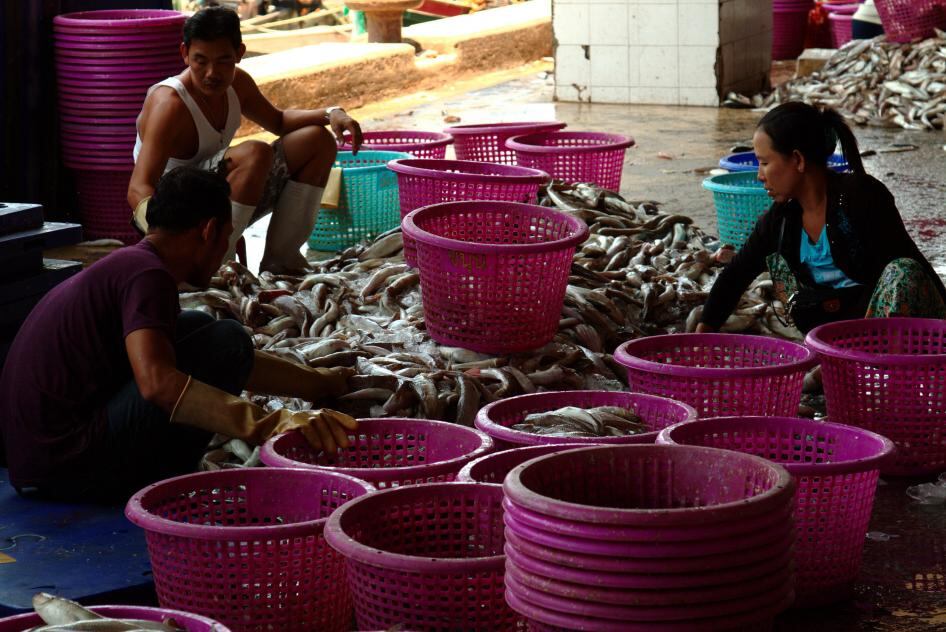Published this week, the report by New York-headquartered NGO Human Rights Watch documents continued abuses such as poor working conditions and recruitment processes that deny workers basic labour rights aboard Thai fishing vessels.
While recognising improvements that have been made, the report also highlights shortcomings in Thai law and the mechanisms put in place that were supposed to protect labourers.
An investigation in 2014 by UK national The Guardian first uncovered the scale of slave labour used in Thailand’s seafood supply chain, producing prawns for major Western manufacturers and retailers such as Walmart, Tesco and Carrefour.
The revelations led to the European Commission issuing Thailand a ‘yellow card’ in April 2015, classing it as a possible ‘non-cooperating country’ in fighting illegal, unreported, and unregulated (IUU) fishing. It then downgraded this to a ‘red card’, which resulted in economic sanctions.
Since then, the Thai government has introduced a series of frameworks for monitoring the fishing industry, such as official checks that are supposed to control vessels each time they arrive and leave a port.
However, the problem persists. The HRW report says: “These reforms have focused primarily on establishing control over fishing operations and tackling IUU fishing. Yet they have had little effect on human rights abuses that workers face at the hands of ship owners, senior crew, brokers, and police officers. Meanwhile, the impact of stronger regulatory controls on improving conditions of work at sea has been limited as a result of poor implementation and enforcement.”
A 2015 official government report said that out of the 474,334 inspections of fishery workers, there was not a single case of forced labour.

The Thai government’s attempt to strike a balance between allowing access to cheap labour for an economically important industry and negative public concerns towards migration has led to “contradictory and inconsistent migration policymaking”.
The crackdown on irregular migration has been ineffective, for instance, and has instead merely forced people to find alternative border crossings, often more dangerous and expensive. This has made people smuggling an even more lucrative trade for traffickers, HRW says.
Checklist for buyers
HRW makes a number of recommendations to international buyers, importers, distributors, and retailers of Thai foods to ensure they have not been produced using slave labour.
These are:
- Require Thai suppliers employing migrant workers to pay the full costs of recruitment – costs that do not have to be ‘refunded’ by the workers.
- Require Thai suppliers to proactively and demonstrably support migrant workers’ rights to freedom of association as a condition of doing business. Where migrant workers seek to engage in collective bargaining, ensure that the company in question bargains in good faith with all workers in the workplace.
- Engage substantively with local and international civil society organizations that are working on migrant rights issues in Thailand to monitor and expose human rights abuses in supply chains, and support interventions by NGOs and migrant workers to protect migrant workers’ rights.
- Pressure employers and the Thai government to ensure workers’ access to speedy and fair complaint channels that provide effective remedies for human rights and labor grievances.
- Publicly support actions by NGOs, labor unions, and migrant worker groups to demand respect for their rights, and act to protect these organizations from retaliation, especially through legal harassment, by companies, employers, brokers, or criminal actors.
HRW also asks the EU policymakers and member state governments to pressure Thailand into passing a low that would criminalise forced labour as a stand-alone offence, as per International Labour Organisation (ILO) standards.
The EU should also urge Thailand to end sections 88 and 101 of the Labour Relations Act, which prevents non-Thai nationals from establishing or registering a labour union, or being able to be elected or appointed to a union committee or subcommittee.
It urges the EU to keep Thailand’s current ‘yellow card’ status in place until “substantive progress in the […] areas of legal reform and law enforcement”.
Last year, a survey commissioned by anti-slavery NGO the International Justice Mission and funded by the Walmart Foundation, questioned migrant fishermen who worked on Thai boats from 2011-2016.
It found that 14% of those questioned said they had been physically abused, 31.5% had witnessed an act of abuse at sea and 76% had amassed debt before they had even started work.
